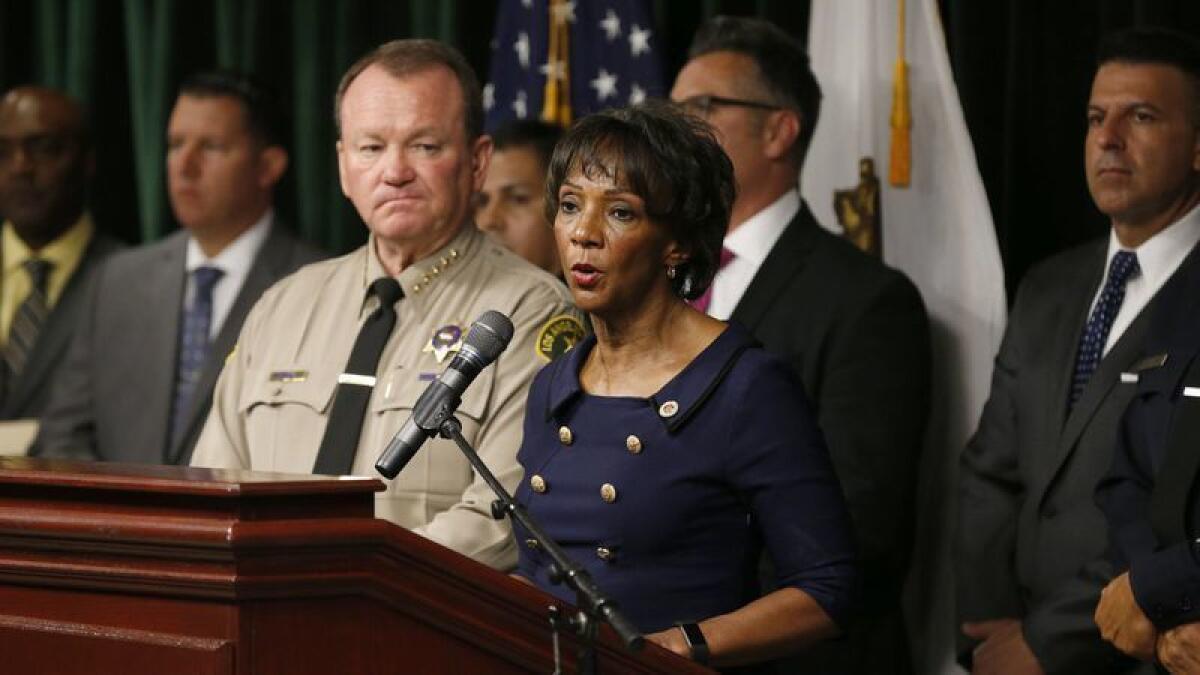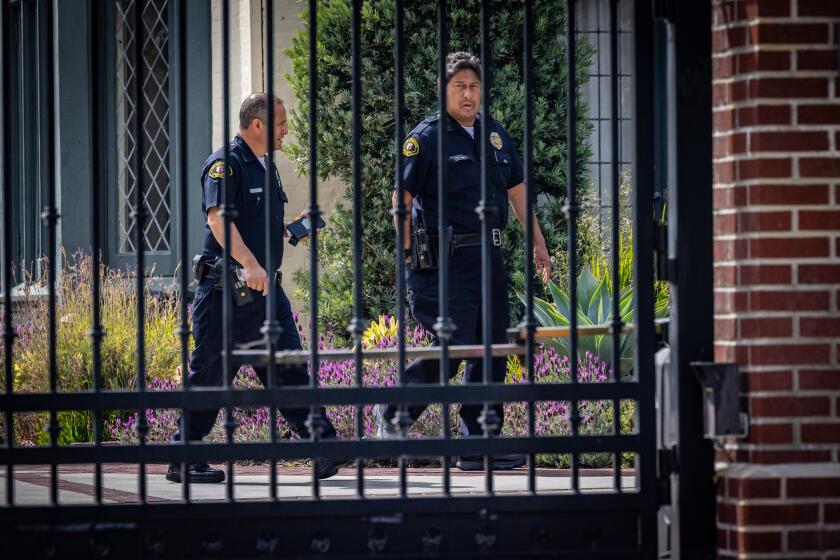L.A. County wanted to question reporters about their records requests. A judge said no

A Los Angeles County judge ruled Tuesday that L.A. Times reporters do not have to disclose the identity of sources or other unpublished information, settling the latest dispute in an ongoing lawsuit over the county’s refusal to disclose government records.
The newspaper alleged in a court filing that county attorneys demanded unnecessary evidence from the journalists who had requested records from the Sheriff’s Department and district attorney’s office. The Times argued that unpublished information is protected by California’s Shield Law and should not be disclosed to satisfy the county’s demand for pretrial evidence.
In granting a motion for a protective order, Superior Court Judge Mary Strobel decided Times reporters don’t have to answer questions as part of pretrial litigation. She sided with Times attorney Kelly Aviles, who argued that the county already has access to the information it was demanding from Times reporters.
“I’m trying to see how you can possibly be surprised when you have detailed factual allegations in the petition,” Strobel told attorney Sarah Lustig, who was representing the county.
Lustig said the county sought details not covered by the Shield Law, such as information on the Times’ email server that might show the newspaper actually received a denial letter from the county in response to one of its requests. The Times has said it never received a response.
“We do believe that he probably got it and maybe they aren’t aware of it,” Lustig said, referring to the letter the county says it sent in response to a records request filed in 2017 by Times editor Jack Leonard.
Aviles said attorneys already checked Times email records and did not find evidence it was received, a claim she said is included in the original lawsuit.
In her ruling, Strobel said that Times attorneys still have to answer a question from the county about whether they received a response to that 2017 request.
In a court filing last week, Times attorneys said the county “has sunk to a new low in its efforts to obstruct access to public records. The county seeks to invade the constitutionally protected rights of journalists with utterly unnecessary discovery demands.”
Lustig and attorney Geoffrey Sheldon argued in a brief filed on behalf of the county that they were “not seeking reporters’ notes or information regarding any unpublished story reporters may be considering writing.” They also contended that the Shield Law does not protect journalists from answering questions in pretrial litigation.
Lustig declined to comment after Tuesday’s hearing.
The hearing was related to a lawsuit filed by The Times last year in which the newspaper accused L.A. County of repeatedly and routinely flouting laws designed to ensure government transparency.
The suit claims that county officials refused to release records about the status of homicide investigations, investigations of sexual misconduct by prosecutors and even mundane information such as work email addresses for Sheriff’s Department employees.
In their request for a protective order, The Times’ lawyers said the county had demanded documents from the newspaper that would show why reporters submitted the requests and who tipped them off. In several instances, the county asked The Times to “identify all witnesses or persons who have knowledge” supporting the newspaper’s claims in its lawsuit.
Open government advocates called any attempt to obtain such information from reporters unprecedented and said such a move could spur other agencies to follow suit to prevent the release of public records and undermine California’s open records laws.
The California Public Records Act, like similar laws around the nation, was designed to ensure voters and taxpayers can quickly access the volumes of documents and data generated by public employees every day.
With limited exceptions, such laws make information such as city contracts with vendors, local government payrolls and the written correspondences of public officials open to inspection. The idea is to ensure transparency, but there is a constant tension between the public’s right to know and government officials’ concerns over privacy and other exemptions to the law or attempts to avoid embarrassment.
In the suit filed in March 2018, Times attorneys accused county officials of issuing “baseless denials” of requests over the years. The county denies violating state records laws.
Among the records at issue in the suit are files involving prosecutors and other employees of the district attorney’s office who have been disciplined for sexual harassment or misconduct.
The request for those records, filed in February 2018 by reporter Marisa Gerber, is timely because the district attorney’s office is reviewing whether to file charges in high-profile cases of celebrities, such as Hollywood producer Harvey Weinstein, who is accused of sexual assault and similar misconduct.
Aviles, The Times’ attorney, said she believes the county’s latest legal gambit is part of a broader effort to slow walk the lawsuit.
“When are we going to get the records — when nobody cares anymore?” Aviles said after the ruling. “They’ve succeeded, and that’s the problem. By merely delaying, they do screw up the Public Records Act — the public can’t get access to documents when they are important, which is the point of the Public Records Act.”
More to Read
Start your day right
Sign up for Essential California for news, features and recommendations from the L.A. Times and beyond in your inbox six days a week.
You may occasionally receive promotional content from the Los Angeles Times.







